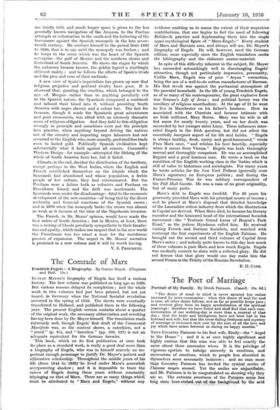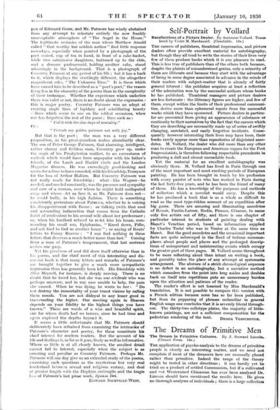The Poet of Marriage
Portrait of My Family. By Derek Patmore. (Cassell., 10s. 6d.) " The desire of mind to mind is never satiated but rather increased by inter-communion : when this desire of soul for soul is true, all other desire follows, and as far as possible keeps pace ; and receives glory from its happy symbolisation of the spiritual yearnings : therefore we have found and shall find that each com- memoration of our wedding-day is more than a renewal of that day ; that the bride and bridegroom have not- heed lost in the husband and wife, but that the neverdailing freshness and mystery of marriage is increased each year by the sum of all the love and joy which have arisen between us during its happy 'months "
Tuts Coventry Patmore to his first wife, Emily—the " Angel in the House " ; and it is at once highly significant and
highly curious that this man was able to feel exactly the same about three successive wives. It is the privilege of vigorous egotism to indulge sincerely in emotions, and successions of emotions, which to people less absorbed in themselves seem necessarily insincere ; and no man more thin CoVentry Patmore has invited the cynical: smiles of lluintme moyen sensuel. Yet the smiles are .unjustifiable, and Mr. Patmore is to be congratulated on shoring why they are so. The extreme sweetness of the Patmore scene his hiiig since, been etched out of. -thethaekgrOund by the acid pen of Edmund Gosse, and Mr. Patmore has -wisely abstained from any attempt to reinstate entirely the now frankly unacceptable atmosphere of " The Angel in the House." The legitimate ecstasies of the man whom Matthew Arnold called " that worthy but mildish author "find little response nowadays, especially when pointed in a photograph of the poet seated, cup of tea in hand, in front of a cake-basket, while two submissive daughters, buttoned up to the chin, and a demure parlourmaid, holding another cake, stand admiringly in the background. That is a photograph of Coventry Patmore at any period of his life ; but it has a back to it, which displays the startlingly different, the altogether magnificent odes, " The Unknown Eros." It is these which have caused him to be described as a " poet's poet," the reason lying less in the obscurity of the poems than in the complexity of their technique. Whether the experience which underlies them was valid or not, there is no doubt about-the expression : this is major poetry. Coventry Patmore was an adept at creating single lines of lapidary and scintillating beauty —lines which occur to one on the oddest occasions, when one has forgotten the rest of the poem ; lines such as : " Foird with the dim days of mortality." _ " Perturb my golden patience not with joy."
But that is the poet ; the man was a very different proposition, as his great-grandson makes abundantly clear. The son of Peter George Patmore, that charming, intelligent, rather clumsy and feckless man, Coventry grew up, under the aegis of his Presbyterian mother, to an earnestness of outlook which would have been unpopular with his father's friends, of the Lamb and Hazlitt circle and the London Magazine dinners. He was exceedingly good-looking and seems for a time to have-consoled, with his-friendship,Tennyson for the loss of Arthur Hallam. But Coventry Patmore was not really made for friendship ; what—like Wagner—he needed, and needed constantly, was the presence and sympathy and care of a woman, over whom he might hold undisputed sway and whom—let us face it, as Mr. Patmore does not— lie could bully, in his high fashion. _There is something consistently portentous about Patmore,whether he is voicing his disappointment with Rome ; or talking (with that cool and astounding indiscretion that comes from the Catholic habit of confession) to his second wife about her predecessor ; or, when his landlord refused to re-let him his house, com- manding his small son, Epiphanies, " Kneel down, Piffie, and ask God to find us another house " ; or saying of Keats' letters to Fanny Brawnc " I can find nothing in these letters that deserves a much better name than lust." Coming from a man of Patmore's temperament, that last sentence makes one gasp.
Yet his greatness of soul did show itself otherwise than in his poems, and the chief merit of this interesting and dis- cursive book is that many letters and remarks of Patmore's arc brought together to give a much more `sympathetic impression than has generally been left. friendship with Alice Meynell, for instance, is deeply moving. There is no doubt that he loved her, but she was une eerebrak who was perhaps unaware, and in any case unable to help, the pain she caused. When he was dying, he wrote . to her : " Do not destroy the immortality of your truest visions by calling them moods. You are not disloyal to any lesser good in transcending the higher. Our meeting again in Heaven depends on your fidelity to the highest things you have known." TheSe are words of a wise and -beaatiftil one for .whom death had no terrors, since he had time and egoin explored the 'depths beyond it.
It seems a little unfortunate that Mr. Patmore should deliberately have refrained from examining the intricacies of Patmore's character and poetry, for these constitute his chief interest for modern readers. But account of his life and dealings is, as far as it goes, lively as well'hs informative. Where so little is at all clearly known, the smallest detail cannot fail to interest, especially when the • subject is as arresting and peculiar as Coventry Patmore. Perhaps Mr. Pat more will one day give us an extended study of the poems, examining such questions as the mysterious but very real borderland between sexual and religious. ecstasy, and deal at greater length with the Hopkins embroglio and the tragic his of Patmore's last prose work, Sponsa Dei. Or: EDWARD SACKVILLE-WEST.











































 Previous page
Previous page